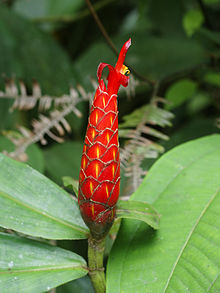Costus pulverulentus, the red cigar or spiral ginger (a name it shares with other members of its family), is a species of flowering plant in the family Costaceae.[2] It is native to Mexico, Central America, Colombia, Venezuela, and Ecuador, and it has been introduced to Cuba and Florida.[1][3] It is invasive in Hawaii.[4]
| Costus pulverulentus | |
|---|---|

| |
| Inflorescence | |

| |
| Habit | |
| Scientific classification | |
| Kingdom: | Plantae |
| Clade: | Tracheophytes |
| Clade: | Angiosperms |
| Clade: | Monocots |
| Clade: | Commelinids |
| Order: | Zingiberales |
| Family: | Costaceae |
| Genus: | Costus |
| Species: | C. pulverulentus
|
| Binomial name | |
| Costus pulverulentus | |
| Synonyms[1] | |
| |
A rhizomatous perennial reaching 4 to 6 ft (1.2 to 1.8 m), Costus pulverulentus is typically found in wet tropical areas.[2] It is used as an ornamental, and there are cultivars, including 'Serena', 'Pink Lips', and 'Purple Passion'.[2][5][4]
Costus pulverulentus has a number of traditional medicinal applications. Ngäbe curanderos in Panama use it to treat pain after giving birth.[6] In Ecuador, Costus pulverulentus is traditionally used to treat snakebite.[7] In Tlanchinol, Hidalgo, Mexico, Costus pulverulentus is used for treating kidney problems and fever.[8]
References
edit- ^ a b "Costus pulverulentus C.Presl". Plants of the World Online. Royal Botanic Gardens, Kew. Retrieved 27 January 2024.
- ^ a b c "Costus Species, Red Cigar, Spiral Ginger". Dave's Garden. MH Sub I, LLC dba Internet Brands. 2021. Archived from the original on 27 January 2024. Retrieved 27 January 2024.
- ^ Wunderlin, R. P.; Hansen, B. F.; Franck, A. R.; Essig, F. B. "Costus pulverulentus". Atlas of Florida Plants. Institute for Systematic Botany, University of South Florida. Retrieved 4 August 2024.
- ^ a b Skinner, Dave (2023). "Gingersrus Database Taxon ID 3353 Costus pulverulentus". gingersrus.com. Le Jardin Ombragé GingersRus.com. Archived from the original on 5 July 2022. Retrieved 27 January 2024.
- ^ "Costus pulverulentus 'Serena'". The Royal Horticultural Society. 2024. Archived from the original on 27 January 2024. Retrieved 27 January 2024.
- ^ Joly, L. G.; Guerra, S.; Séptimo, R.; Solís, P. N.; Correa, M.; Gupta, M.; Levy, S.; Sandberg, F. (1987). "Ethnobotanical inventory of medicinal plants used by the Guaymi Indians in Western Panama. Part I.". Journal of Ethnopharmacology. 20 (2): 145–171.
- ^ Kvist, Lars Peter; Holm-Nielsen, Lauritz B. (1987). "Ethnobotanical aspects of lowland Ecuador". Opera Botanica. 92: 83–107.
- ^ Andrade-Cetto, Adolfo (2009). "Ethnobotanical study of the medicinal plants from Tlanchinol, Hidalgo, México" (PDF). Journal of Ethnopharmacology. 122 (1): 163–171. doi:10.1016/j.jep.2008.12.008. Retrieved 4 August 2024.